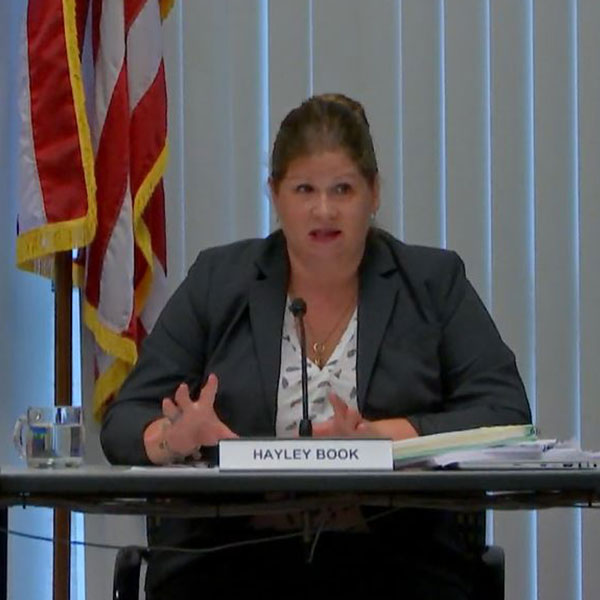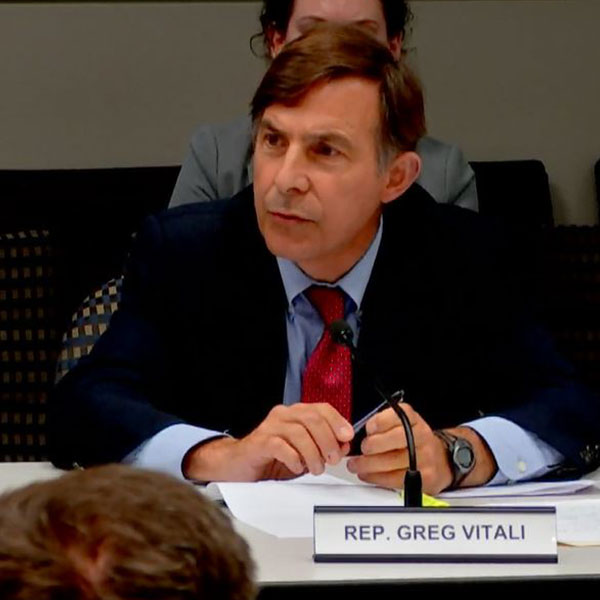Pennsylvania’s effort to join the Regional Greenhouse Gas Initiative (RGGI) took a big step forward Tuesday when the state Environmental Quality Board (EQB) backed the final rules for the state’s participation in the initiative, saying it will eliminate between 97 million and 227 million tons of carbon pollution over 10 years.
The board voted 15-4 after a two-hour meeting at which officials from the state’s Department of Environmental Protection (DEP) outlined the final rules amid several unsuccessful efforts by Republican lawmakers to put the initiative’s advance on hold pending further review. After more than 18 months of public hearings to craft and evaluate the rules, the 92-page package will now undergo review by the Independent Regulatory Review Commission (IRRC) and the state attorney general and, if approved, go to final publication. The DEP expects the state to join RGGI in 2022.
As laid out in the DEP’s presentation, RGGI participation will reduce the CO2 emissions from Pennsylvania’s second largest source of emissions, fossil-fuel electricity generation. It will trigger benefits, including the improvement of air quality, a reduction in the threat to residents’ health and the generation of up to $188 million in revenue that will be used for energy efficiency measures, especially in environmental justice areas.
Released in 2018, Pennsylvania’s climate action plan aims to reduce greenhouse gas emissions by 26% over 2005 levels by 2025, and 80% by 2050. According to the DEP, the state generated 241.12 million metric tons of CO2 in 2018, more than countries such as Greece, Sweden and Singapore.

“This is extremely important in achieving the Commonwealth greenhouse gas reduction goals,” said Hayley L. Book, senior advisor on energy and climate to the secretary of the DEP, presenting details of the rules. “This is really the cornerstone of the Commonwealth climate change program at this juncture.”
She said that although the initiative will not “solve global climate change … it’s certainly going to aid this Commonwealth in addressing our share of the impact.”
But Sen. Gene Yaw (R) called the rules “a superficial stab at addressing climate change” that “does not address the big picture.”
“RGGI really targets a very, very small part of the energy production [sector], and that happens to be some coal-fired power plants,” he said, adding that he believes RGGI will shut down the production of energy in Pennsylvania, which will instead be produced elsewhere.
“We drive the jobs out of the state, and they either go to another state or they go to a foreign country,” he said.
But Rob Altenburg, senior director for energy and climate at PennFuture, a statewide advocacy group, called the vote “a significant milestone after years of climate inaction in Harrisburg,” the state capital.
“Today’s vote will be applauded by a majority of Pennsylvanians who demand immediate action on climate change,” he said.
Cap and Trade
If Pennsylvania’s rules are enacted, the state will join an initiative of 10 New England and Mid-Atlantic states to reduce GHG emissions from the power sector. The states ― Connecticut, Delaware, Maine, Maryland, Massachusetts, New Hampshire, New Jersey, New York, Rhode Island and Vermont ― have agreed to cap, or put a limit on, their carbon dioxide emissions from in-state electric power plants.
North Carolina also approved rules for joining RGGI on Tuesday. (See NC Panel Oks RGGI Rulemaking.)

Under RGGI, power plants that continue to emit CO2 must buy “allowances” equal to the amount of their emissions ― one allowance for each ton of CO2 emissions. The allowances can be purchased and traded on a market. Funds reaped from a quarterly auction of allowances are divided among the states for reinvestment in efficiency and other GHG reduction programs that further reduce power sector emissions.
The rulemaking approved Tuesday does not spell out in detail how the state would distribute auction revenues, saying only that they will be used to eliminate air pollution. The DEP told the meeting that the RGGI auctions should yield between $131 million and $187 million for Pennsylvania, depending on the price of the allowances and how many are bought and sold. The DEP said the money will be spent on energy efficiency and renewable energy development, but the details will be determined after public input by a separate board.
Dueling Perspectives
Gov. Tom Wolf (D) has been battling with the Republican majority legislature since he signed an executive order in 2019 directing the DEP to draft the rulemaking for joining the compact. In September, the General Assembly passed a bill barring the state from joining RGGI or taking any action to control CO2 emissions without legislative approval, but Wolf vetoed it.
RGGI opponents contend the Pennsylvania Air Pollution Control Act requires the DEP to submit regional air pollution programs to the legislature and that the RGGI rule constitutes a “tax,” which requires legislation. The Wolf administration counters that because auction proceeds would be used for initiatives to reduce CO2 emissions, they would be considered administrative costs of implementing the state’s air pollution control program.

The DEP said at a May meeting of the Small Business Compliance Advisory Committee that it had received about 14,000 comments on the rules, from groups including legislators, labor unions, consumer groups and faith-based groups. The DEP said Tuesday that it had taken testimony from 449 people in 10 hearings. (See: Pa. Releases Rulemaking to Join RGGI.)
The most common comments in opposition to the rules were about the adverse impact on fossil-fuel communities and small businesses, the expected increase in electricity costs and potential statewide economic harm. A substantial portion of the comments also argued that RGGI rules amounted to a tax, not a fee.
The most common arguments in favor of the rules stressed the success of cap-and-trade initiatives and the health and economic benefits of regulation, the DEP said.
Rep. Greg Vitali (D), pledging to vote for the rules, called them a “small step …. but a good small step.” He said the concerns about job loss were “unsubstantiated” and the state had to act quickly.
“We are moving towards a slow-motion catastrophe,” Vitali said. “Anyone who pays attention to what scientists tell us knows this is a crucial problem, and it needs to be dealt with yesterday. Pennsylvania is an enormous greenhouse gas producer, and we have to do something.”



